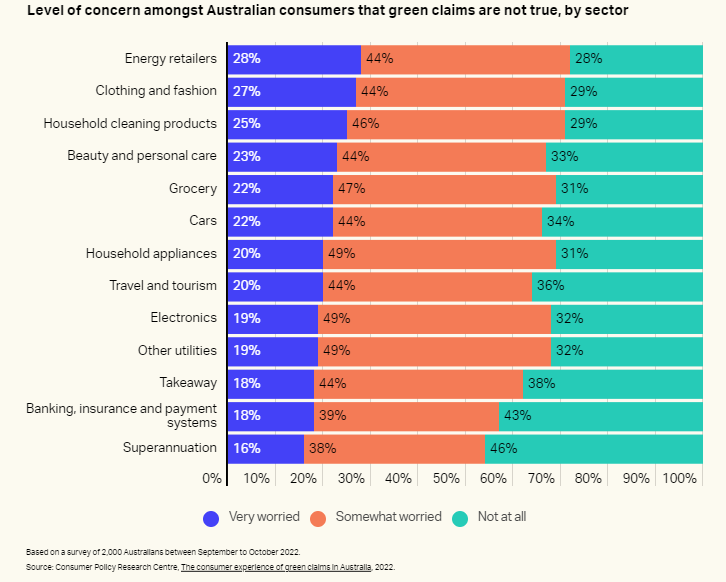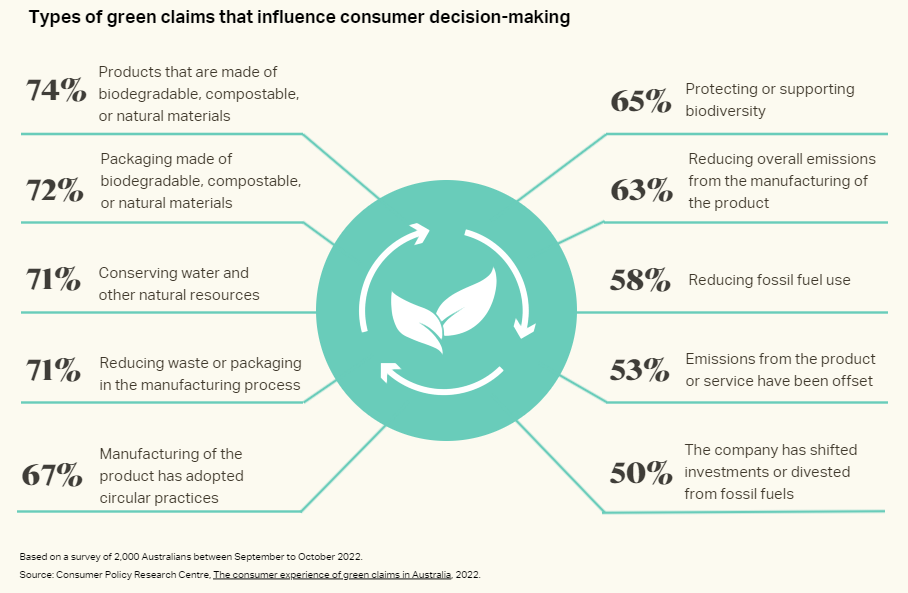The latest Spotlight series takes the topic of sustainability in Australia from theory into practice – a curation of case studies and tangible examples of what’s working in the Australian market. As part of the series, the Spotlight infographic examines consumer data from ongoing surveys of internet users in Australia, provided by GWI and supported by knowledge and opinion from industry experts.
This article is part of a Spotlight series on sustainability in Australia. Read more
In 2022, a study of 247 businesses by the Australian Competition and Consumer Commission (ACCC) revealed that 57% had made concerning and potentially misleading claims about their environmental credentials. This includes vague and unqualified statements such as being “kind to the planet”, “100% plastic-free” or simply “sustainable”, without further information to explain the label.
And it’s not just consumer watchdogs keeping an eye on brands – consumers themselves are skeptical, too. More than half of 2,000 surveyed Australians reported feeling either very or somewhat worried about the legitimacy of environmental claims from businesses. The biggest concerns were around claims made by energy retailers (72%), clothing and fashion brands (71%), and household cleaning brands (71%).

Greenwashing, or making false or unsubstantiated claims about sustainability, isn’t a new problem in Australia. However, brands clearly have room for improvement when it comes to building their credibility in this space and there’s never been a better time to get it right. Climate concerns in the country are at a record high and consumers expect brands to lead the sustainability charge. Nearly a third (31%) of Australians think brands should take primary responsibility in helping consumers to shop sustainably (versus 28% who think the responsibility falls on the shoulders of the government).
Addressing the sustainability gap means brands must move beyond hollow marketing tactics to earn the trust of consumers
While there’s been much doubt surrounding the legitimacy of green claims, evidence suggests they remain effective at influencing purchase decisions. In an analysis of US sales data across 32 food, beverage, personal care and household categories, McKinsey found that products with environmental, social and governance (ESG) claims experienced disproportionately greater retail sales growth over the past five years compared to products that made no such claims.
That said, some claims resonate more with consumers than others. Data from the Consumer Policy Research Centre (CPRC) shows that tangible claims relating to product or packaging have the greatest influence on Australian consumers’ decision making, while more generalised claims about the business (e.g. offsetting emissions and divesting from fossil fuels) tend to be less impactful.

Official accreditation is another powerful way to evidence brand claims and build trust. Over half (69%) of Australian consumers say having a trust mark would increase their confidence that an environmental claim is true. When choosing a certification scheme from external parties, the ACCC advises businesses to:
- Opt for a scheme that is unbiased and well-regarded.
- Ensure that the certification represents the characteristics of the product, service or business.
- Provide customers with more details about the scheme directly or point them to sources where they can find such information.
Greenwashing is more than a misleading marketing tactic – it’s a betrayal of consumers’ trust. With consumers becoming more concerned about climate issues, the imperative for brands to bridge the trust gap has never been greater. Brands that make genuine strides towards sustainability goals must not shy away from communicating their efforts to customers but they must do so with an understanding of the messages that work with the Australian market.
To find out more, read our Spotlight Australia infographic here
Read more in this Spotlight series
Addressing greenhushing: Redefining sustainable value in Australia
Rica Facundo
WARC
Design, sustainability and accessibility: How Good Citizens’ eyewear makes ‘trash’ worthy
Nik Robinson
Good Citizens Eyewear
How sustainability is No 1 and No 2 for Who Gives A Crap
Maria Chilewicz
Who Gives A Crap
Sustainability: From “A noble crusade” to “A bit better every day”
Toby Harrison
Ogilvy Network ANZ
Creating sustainable value through system thinking
Lee Simpson
whiteGREY Australia
The Big Picture: Concerned Aussies want brands to take action
Spotlight infographic
WARC

